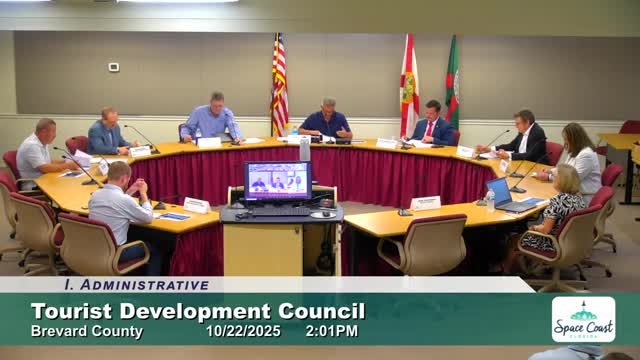Clerk begins taking over Brevard County tourist tax collection as tax collector cites budget cuts, data gaps with platforms

Summary
Brevard County began transitioning collection of the tourist development tax to the clerk's office in October, county staff told the Brevard County Tourist Development Council on Oct. 8, and officials warned that full compliance and reconciliations will take months.
Brevard County began transitioning collection of the tourist development tax to the clerk's office in October, county staff told the Brevard County Tourist Development Council on Oct. 8, and officials warned that full compliance and reconciliations will take months.
Marty Miller of the clerk's office told the council the office assembled a team, bought new software designed for short-term rental tax collection and has been registering operators since the changeover. "As of today, we stand in collections around $844,000," Miller said, adding that the office has not yet received permitting or detailed remittance data from platforms such as VRBO and Airbnb.
Why it matters: TDT funds pay for Brevard County tourism programs and beach-related work; short-term rentals and third-party platforms account for a significant and growing share of local TDT revenue, and county staff said incomplete platform data complicates enforcement and reconciliation.
Miller said the clerk's office is concentrating first on getting hosts and property managers registered and that compliance work will follow. "Once we get the majority of people registered ... then the compliance portion will come into effect," he said. He said the clerk's office has asked the county GIS team to integrate mapping into a platform called Deckard Technologies (the vendor referenced as the county's mapping/scraping partner) so staff and code enforcement can see geolocated listings.
Tax Collector's office explained pullback
Lisa, the Brevard County tax collector who addressed the council, said the office stopped collecting the TDT as a budgetary decision. "I officially notified the county manager's office that I would no longer collect the tourist development tax on 05/01/2025. This was a budgetary decision for the tax collector's office, plain and simple," she said, referencing budget pressure after a 2023 county commission action.
Lisa said the decision traces to a 2023 Board of County Commissioners action, recorded in Resolution 23-61, in which the commission sought greater oversight of constitutional officers' budgets. Because many tax-collector functions are statutorily required work done for state agencies, she said, she cut discretionary services and that TDT collection was one such discretionary item.
Platforms, VCAs and enforcement limits
Both the clerk's office and Lisa described limits to enforcement when platforms keep data private. Miller said some platforms negotiated voluntary collection agreements (VCAs) that withhold host-level data; those agreements give property owners the option on some platforms to have the platform collect and remit tax or to remit themselves. Miller said the clerk can request platform detail once per year to reconcile who used the platform but remitted their own taxes.
"They give their clients the option," Miller said of the platforms, and that arrangement leaves counties 1 annual chance to reconcile platform rosters to county registrations.
Council members and hotel operators pressed for clarity about listings in unincorporated Brevard County where short-term rentals may violate zoning. Miller and other staff said Deckard's mapping can show geolocated listings and the platform can be used by code enforcement and the property appraiser to spot potential violations; they also said initiating a code-enforcement action typically requires a complaint from a neighbor or property owner unless the responsible agency chooses to open an investigation.
Council response and next steps
Council members asked for a demonstration of the clerk's mapping and registration portal. Miller said staff can bring a web-demo to a future meeting to show how the county is identifying listings, and he described an initial spike in registrations as operators adjusted to the change.
The clerk and the tax collector both urged cooperation among the clerk, code enforcement and the property appraiser to address homesteaded properties used as short-term rentals. Lisa said she has already shared account data she had under her earlier contract and encouraged the TDC to work with the clerk to pursue enforcement. Miller said the clerk will focus next on building registration and data flows so targeted compliance and audits can follow.
Ending
The clerk's office said it will return to the council with a demonstration of the mapping and registration tools. The tax collector reiterated the move was driven by budget choices made after Resolution 23-61 and encouraged coordination with code enforcement and the property appraiser for cases of suspected illicit rentals.

